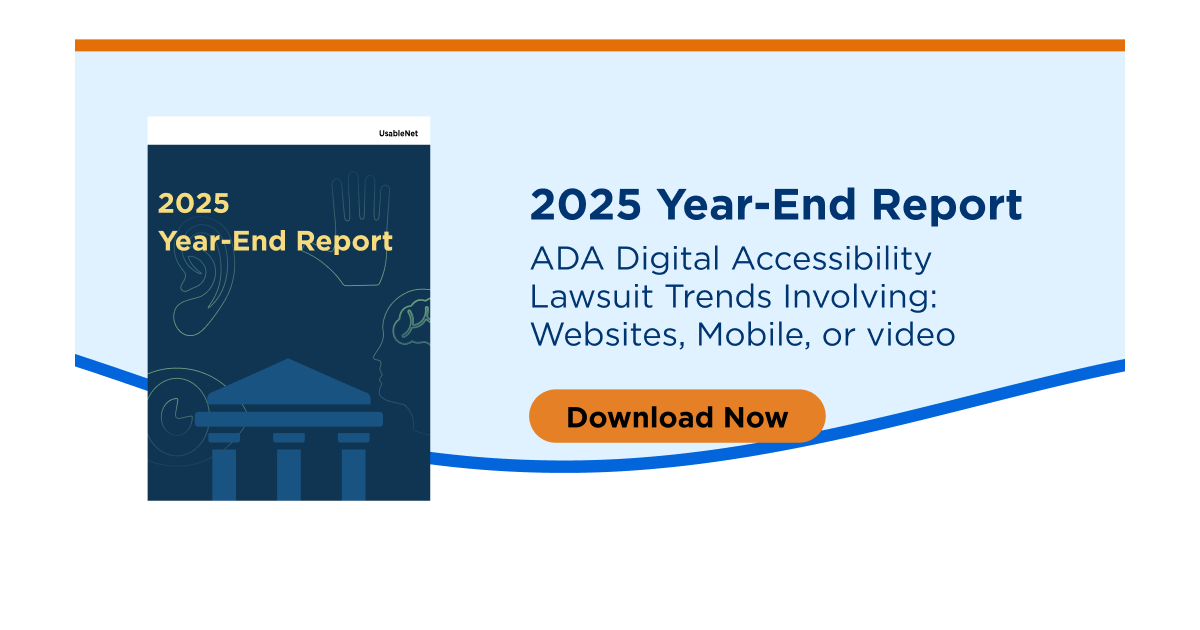For the better part of the past two decades, it’s been a well-established legal argument that organization's websites and Apps were covered under the Americans with Disabilities Act (ADA). This meant that they needed to make reasonable accommodations for accessibility for all users.
The April 7th, 2021 decision in the Florida 11th Circuit Court, however, broke with this trend. A judge decided that Winn Dixie’s limited accessibility site, at the time of the lawsuit in 2017, didn’t violate the rights of the blind plaintiff under the ADA,
A lot has been written on this most recent decision which we outline below, but it's worth noting that Winn-Dixie and Southeastern Grocers have not ignored accessibility since the start of this case. In fact, their website's accessibility statement acknowledges the importance and current commitment to accessibility.
One positive takeaway for the disability community is that fighting this lawsuit for Winn-Dixie has not been about if the grocer should make their website accessible, but if a plaintiff could force digital accessibility via an ADA lawsuit.
Gil vs. Winn Dixie: What Happened
Juan Carlos Gil, the blind plaintiff, sued Winn Dixie. The plaintiff claimed the site violated the ADA in 2017. Aspects of the site weren’t compatible with screen readers, so he was unable to order his medications online or download rewards cards.
The initial bench trial concluded that the ADA had been violated, as the site was heavily integrated with the in-store experience.
The case then went to the 11th circuit, where Judge Branch just recently reversed the decision. She claimed that the lack of site accessibility didn’t create an “intangible barrier” because the individual could go into the store. Branch also said that regulating ADA restrictions was best left to congress.
This ruling ignored the fact that the site didn’t provide any accessibility aids because they claimed it wasn’t needed to do business.
What This May Mean for Other Accessibility Lawsuits In Florida & Beyond
The Gil vs. Winn Dixie case in Florida was groundbreaking, and not in a good way. It broke precedent, and it had people in legal, accessibility and disability communities wondering what it meant for other ADA lawsuits moving forward.
While we don’t know exactly what will happen, I’ve got some predictions. Let’s take a look at what this might mean for accessibility lawsuits in Florida and others states in the US.
1. These Changes Will Most Likely Only Impact Florida-Based Cases
Our team believes that we’re unlikely to see similar rulings adopted by other states, especially not at a rapid pace.
It’s particularly unlikely that more politically liberal states like New York and California will not follow suit, and since the majority of cases from these two states, most ADA cases and rulings will likely remain largely unaffected.
2. It May Bring the DOJ Back to the Table
Before 2016, the Department of Justice was actively involved in ADA cases, setting a strong precedent that websites needed to be fully accessible.
With the change in administration, that stopped, but there’s a good chance that this may be resumed again, particularly following the Florida case that goes against their direct views and precedents that websites should be subjected to the ADA.
It is worth mentioning that the judge mentioned that Congress should step in to set regulations; that may be something that happens, finally setting “recommendations” like following the WCAG 2.1 into law.
3. The Supreme Court May Get Involved
It’s possible that the plaintiff won’t accept this ruling and that they’ll bring it to the Supreme Court. If so, there’s a solid chance that they would overturn the Florida ruling since it goes directly against the precedent set by the DOJ in multiple cases in the past.
A Commitment to Accessibility
Winn-Dixie has an accessibility statement posted on their website and commits to adhere to WCAG 2.0 AA and to use testers from the disability community to periodically check the accessibility of their site.
We've included it below or you can read the accessibility statement here.
"Southeastern Grocers is committed to facilitating the accessibility and usability all of its digital properties, including “WinnDixie.com”, for all people with disabilities. Southeastern Grocers has implemented the relevant portions of the World Wide Web Consortium's Web Content Accessibility Guidelines 2.0 Level AA (WCAG 2.0 AA) as its web accessibility standard. Our website is tested on a periodic basis with assistive technology such as screen readers and screen magnifiers, and with users with disabilities who use these technologies."
It's crucial that all businesses (including Florida businesses) are still ensuring that their sites are fully ADA accessible. Winn-Dixie's win is meant to discourage the litigious landscape around ADA digital lawsuits, but it should not discourage companies from making websites and apps accessible.
Making up 26% of the population, people with disabilities are the largest minority in the US. Accessibility allows all of your customers to work with you in the way they choose.
Many articles have been written on this important decision. If you'd like to read more, here are a few perspectives from both disability rights and defense lawyers.
- Narrow Winn-Dixie Court Opinion Limits Certain Types of Web Accessibility Lawsuits in three U.S. States via the Law Office of Lainey Feingold
- “Winn’s of Change?” The Eleventh Circuit in Gil v. Winn-Dixie Stores, Inc. Holds That Websites Are Not Places of Public Accommodation Under the ADA via Gibbons P.C.
- Eleventh Circuit Says Winn Dixie’s Inaccessible Website Does Not Violate The ADA via Seyfarth Shaw LLP
- The Eleventh Circuit Issues Important Opinion on the Inapplicability of Title III of the Americans with Disabilities Act to Consumer-Facing Websites via Blank Rome
Not sure if your site needs accessibility work? Run a free automated test with UsableNet AQA.







